
Abnormal Labs ICD-10-CM Codes
A complete guide to Abnormal Labs ICD-10-CM codes for 2023. Find commonly used codes, billability, clinical info, synonyms, and frequently asked questions.
Use Code
Commonly asked questions
Abnormal lab results mean that one or more tests returned results outside the standard range, which may suggest an underlying medical condition or temporary factors like medication, diet, or stress.
After receiving abnormal lab results, healthcare providers usually conduct further testing or evaluation to understand the cause and, if necessary, start appropriate treatment.
While rare, lab errors can occur. If results are unexpected or inconsistent with the patient's health status, doctors may repeat the tests for confirmation.
EHR and practice management software
Get started for free
*No credit card required
Free
$0/usd
Unlimited clients
Telehealth
1GB of storage
Client portal text
Automated billing and online payments
